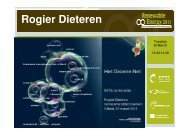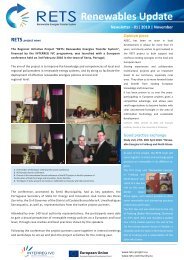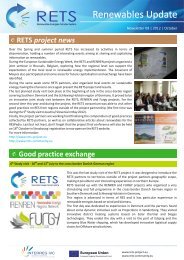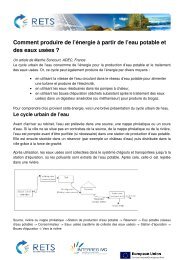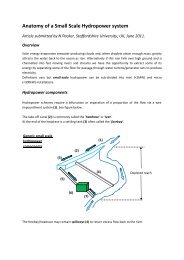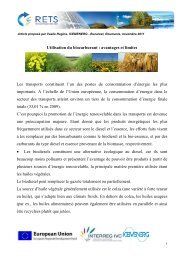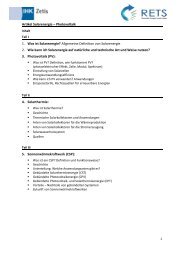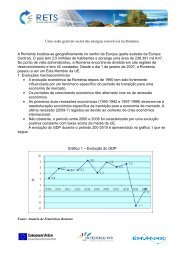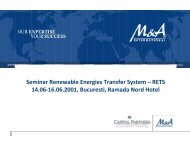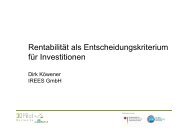Promoting renewable energies - RETS Project
Promoting renewable energies - RETS Project
Promoting renewable energies - RETS Project
You also want an ePaper? Increase the reach of your titles
YUMPU automatically turns print PDFs into web optimized ePapers that Google loves.
Association of Municipalities of Cove ad<br />
Beira, with Pinhel, Portugal<br />
This project is intended to strengthen the Cross the<br />
Border Energetic Optimisation Plan (PTOE) bonds for<br />
the development of Renewable Energies. PTOE’s main<br />
goal was: to analyse and study the municipality buildings'<br />
electrical energy consumption, through the consumer’s<br />
monthly readings and its characteristics, as well as<br />
presenting solutions for the rationalisation of energy via<br />
proposed corrections / alterations for a more efficient<br />
management use of energy in those buildings.<br />
The study, which involved the Energy Optimisation Plan,<br />
is divided in four major areas which are:<br />
Energy optimisation of Public lighting networks;<br />
Energy optimisation of Municipal buildings;<br />
Taxes optimisation study;<br />
Powering factor correction.<br />
This project had a total cost of: €750,000. As far as<br />
Pinhel is concerned the Public lighting survey was made<br />
to 21 conversion posts in total 1,464 light spots (of which<br />
74% were sodium vapour light bulbs and 26% were<br />
mercury vapour light bulbs). The estimated energy<br />
reduction percentage is equivalent to 38%, which<br />
economically speaking represents an amount of €49,446<br />
if all measures were to be taken. These goals can only<br />
be obtained after a global investment of €136,125 in<br />
energy efficient equipment, being the estimated time of<br />
the investment's feedback of 2.75 years. These<br />
measurements also bring an environmental benefit<br />
through the reduction of polluting CO2 emissions of about<br />
562 ton/per year.<br />
Four Phases are planned, with phase 1, including the<br />
creation of an inventory data base (an energy<br />
dependency study); phase 2 with tariff analysis and data<br />
procession; phase 3 with the elaboration of an action<br />
plan (explicitly stating the measures); and phase 4<br />
involving the training of the municipal energy manager.<br />
One of the projects within the PTOE is MUNIEnergy:<br />
It is a Municipal Energetic Optimisation project which<br />
suggested measures targeted by both technical and<br />
economic studies aiming at the practical application of<br />
the measures identified in the PTOE. It investigates<br />
replacing electric energy by solar energy in sports’<br />
pavilions, biomass energy in swimming pools and to<br />
produce electricity from solar conversion.<br />
Whilst a 32% reduction in bills for public lighting was<br />
achieved by the installation of a hundred lighting flux<br />
regulators placed on the transformation polls (to fit the<br />
light intensity to the hours of less movement) and by the<br />
replacement of over 8,600 light bulbs for electronic<br />
ballasts. The project includes 24 water heating systems<br />
across the Municipalities, 1400 m 2 of solar panels,<br />
reducing fossil fuel consumption by 890 MW, and CO2 by<br />
550 tonnes.<br />
Street lamps in Pinhel, Portugal<br />
<strong>RETS</strong> Compendium – © 2012 <strong>RETS</strong> Consortium<br />
45



